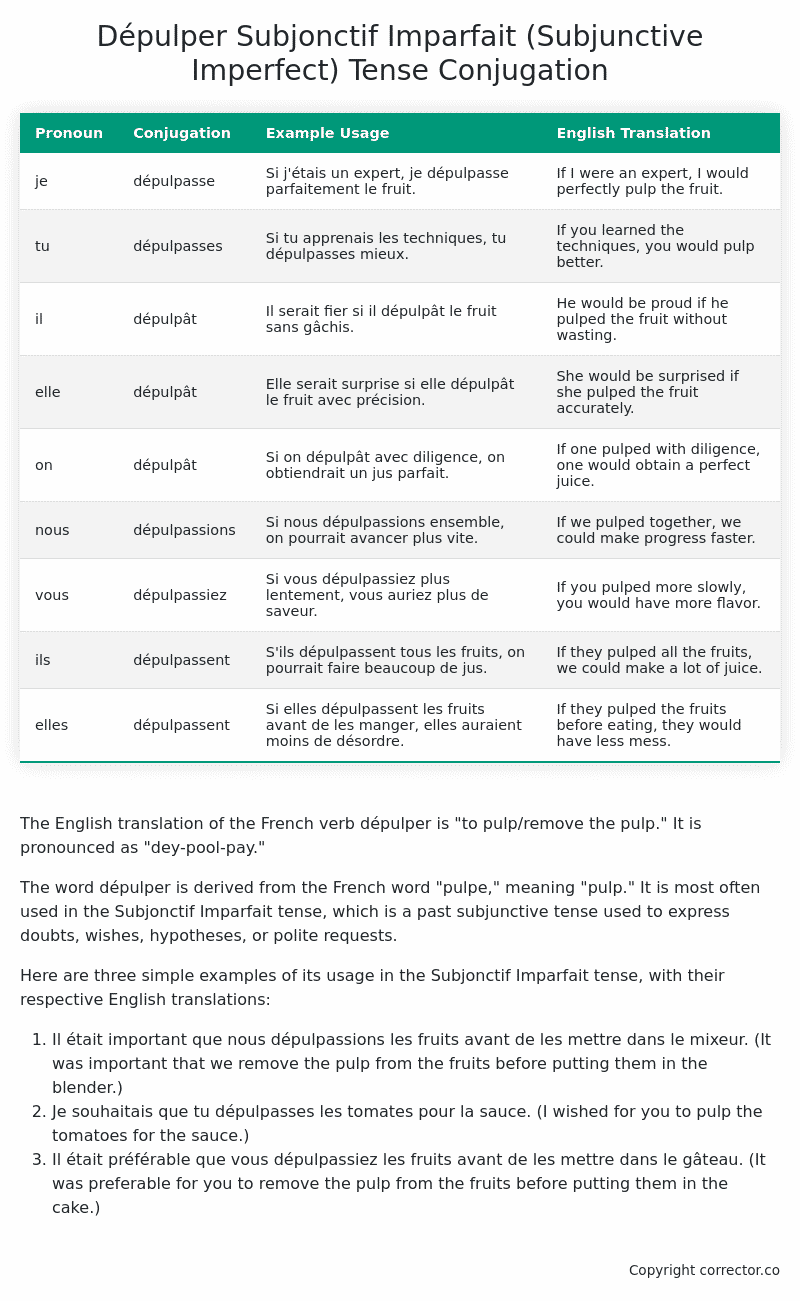Subjonctif Imparfait (Subjunctive Imperfect) Tense Conjugation of the French Verb dépulper
Introduction to the verb dépulper
The English translation of the French verb dépulper is “to pulp/remove the pulp.” It is pronounced as “dey-pool-pay.”
The word dépulper is derived from the French word “pulpe,” meaning “pulp.” It is most often used in the Subjonctif Imparfait tense, which is a past subjunctive tense used to express doubts, wishes, hypotheses, or polite requests.
Here are three simple examples of its usage in the Subjonctif Imparfait tense, with their respective English translations:
- Il était important que nous dépulpassions les fruits avant de les mettre dans le mixeur. (It was important that we remove the pulp from the fruits before putting them in the blender.)
- Je souhaitais que tu dépulpasses les tomates pour la sauce. (I wished for you to pulp the tomatoes for the sauce.)
- Il était préférable que vous dépulpassiez les fruits avant de les mettre dans le gâteau. (It was preferable for you to remove the pulp from the fruits before putting them in the cake.)
Table of the Subjonctif Imparfait (Subjunctive Imperfect) Tense Conjugation of dépulper
| Pronoun | Conjugation | Example Usage | English Translation |
|---|---|---|---|
| je | dépulpasse | Si j’étais un expert, je dépulpasse parfaitement le fruit. | If I were an expert, I would perfectly pulp the fruit. |
| tu | dépulpasses | Si tu apprenais les techniques, tu dépulpasses mieux. | If you learned the techniques, you would pulp better. |
| il | dépulpât | Il serait fier si il dépulpât le fruit sans gâchis. | He would be proud if he pulped the fruit without wasting. |
| elle | dépulpât | Elle serait surprise si elle dépulpât le fruit avec précision. | She would be surprised if she pulped the fruit accurately. |
| on | dépulpât | Si on dépulpât avec diligence, on obtiendrait un jus parfait. | If one pulped with diligence, one would obtain a perfect juice. |
| nous | dépulpassions | Si nous dépulpassions ensemble, on pourrait avancer plus vite. | If we pulped together, we could make progress faster. |
| vous | dépulpassiez | Si vous dépulpassiez plus lentement, vous auriez plus de saveur. | If you pulped more slowly, you would have more flavor. |
| ils | dépulpassent | S’ils dépulpassent tous les fruits, on pourrait faire beaucoup de jus. | If they pulped all the fruits, we could make a lot of juice. |
| elles | dépulpassent | Si elles dépulpassent les fruits avant de les manger, elles auraient moins de désordre. | If they pulped the fruits before eating, they would have less mess. |
Other Conjugations for Dépulper.
Le Present (Present Tense) Conjugation of the French Verb dépulper
Imparfait (Imperfect) Tense Conjugation of the French Verb dépulper
Passé Simple (Simple Past) Tense Conjugation of the French Verb dépulper
Passé Composé (Present Perfect) Tense Conjugation of the French Verb dépulper
Futur Simple (Simple Future) Tense Conjugation of the French Verb dépulper
Futur Proche (Near Future) Tense Conjugation of the French Verb dépulper
Plus-que-parfait (Pluperfect) Tense Conjugation of the French Verb dépulper
Passé Antérieur (Past Anterior) Tense Conjugation of the French Verb dépulper
Futur Antérieur (Future Anterior) Tense Conjugation of the French Verb dépulper
Subjonctif Présent (Subjunctive Present) Tense Conjugation of the French Verb dépulper
Subjonctif Passé (Subjunctive Past) Tense Conjugation of the French Verb dépulper
Subjonctif Imparfait (Subjunctive Imperfect) Tense Conjugation of the French Verb dépulper (this article)
Subjonctif Plus-que-parfait (Subjunctive Pluperfect) Tense Conjugation of the French Verb dépulper
Conditionnel Présent (Conditional Present) Tense Conjugation of the French Verb dépulper
Conditionnel Passé (Conditional Past) Tense Conjugation of the French Verb dépulper
L’impératif Présent (Imperative Present) Tense Conjugation of the French Verb dépulper
L’infinitif Présent (Infinitive Present) Tense Conjugation of the French Verb dépulper
Struggling with French verbs or the language in general? Why not use our free French Grammar Checker – no registration required!
Get a FREE Download Study Sheet of this Conjugation 🔥
Simply right click the image below, click “save image” and get your free reference for the dépulper Subjonctif Imparfait tense conjugation!

Dépulper – About the French Subjonctif Imparfait (Subjunctive Imperfect) Tense
Formation
Common Everyday Usage Patterns
Interactions with Other Tenses
Subjonctif Présent
Indicatif Passé Composé
Conditional
Conditional Perfect
Summary
I hope you enjoyed this article on the verb dépulper. Still in a learning mood? Check out another TOTALLY random French verb conjugation!


